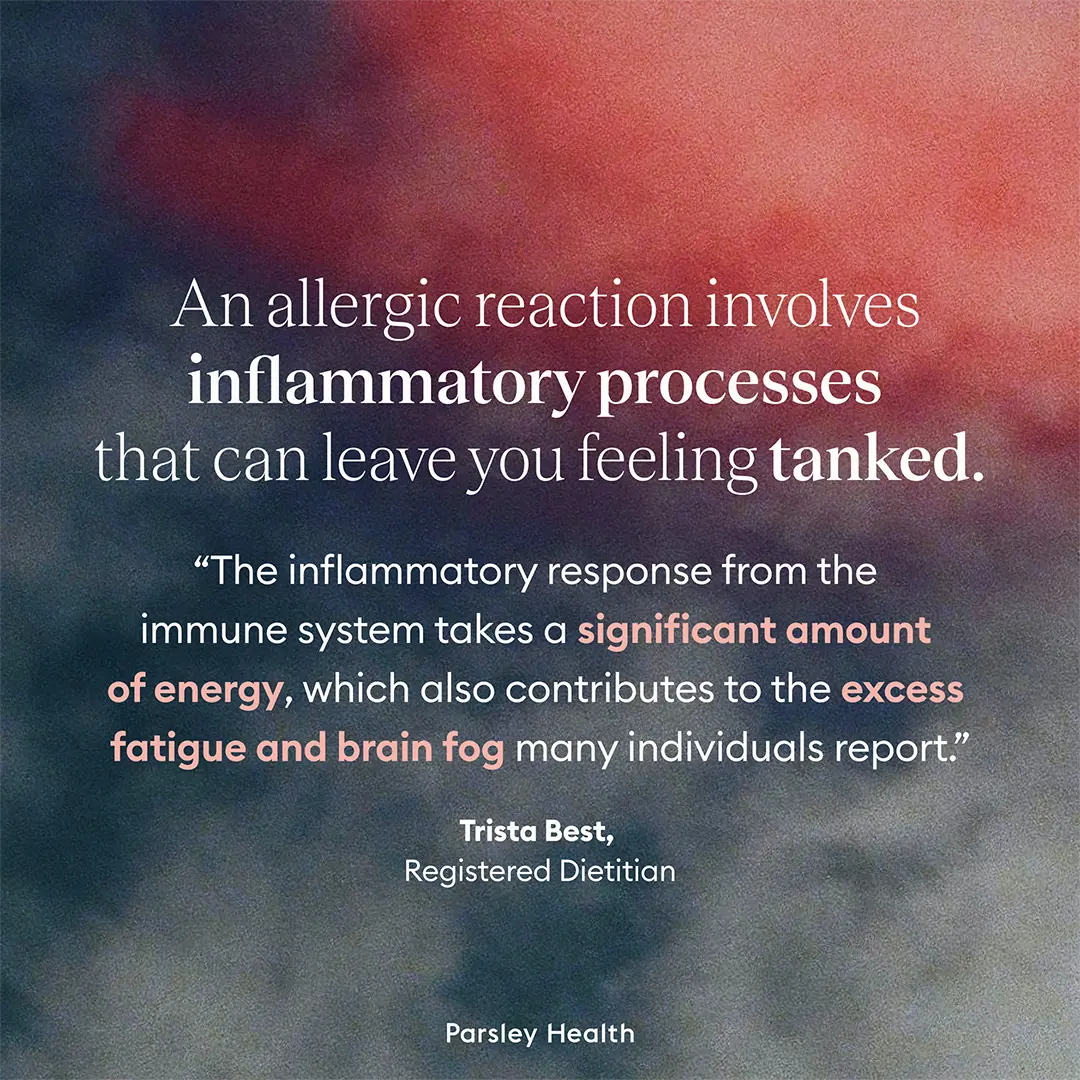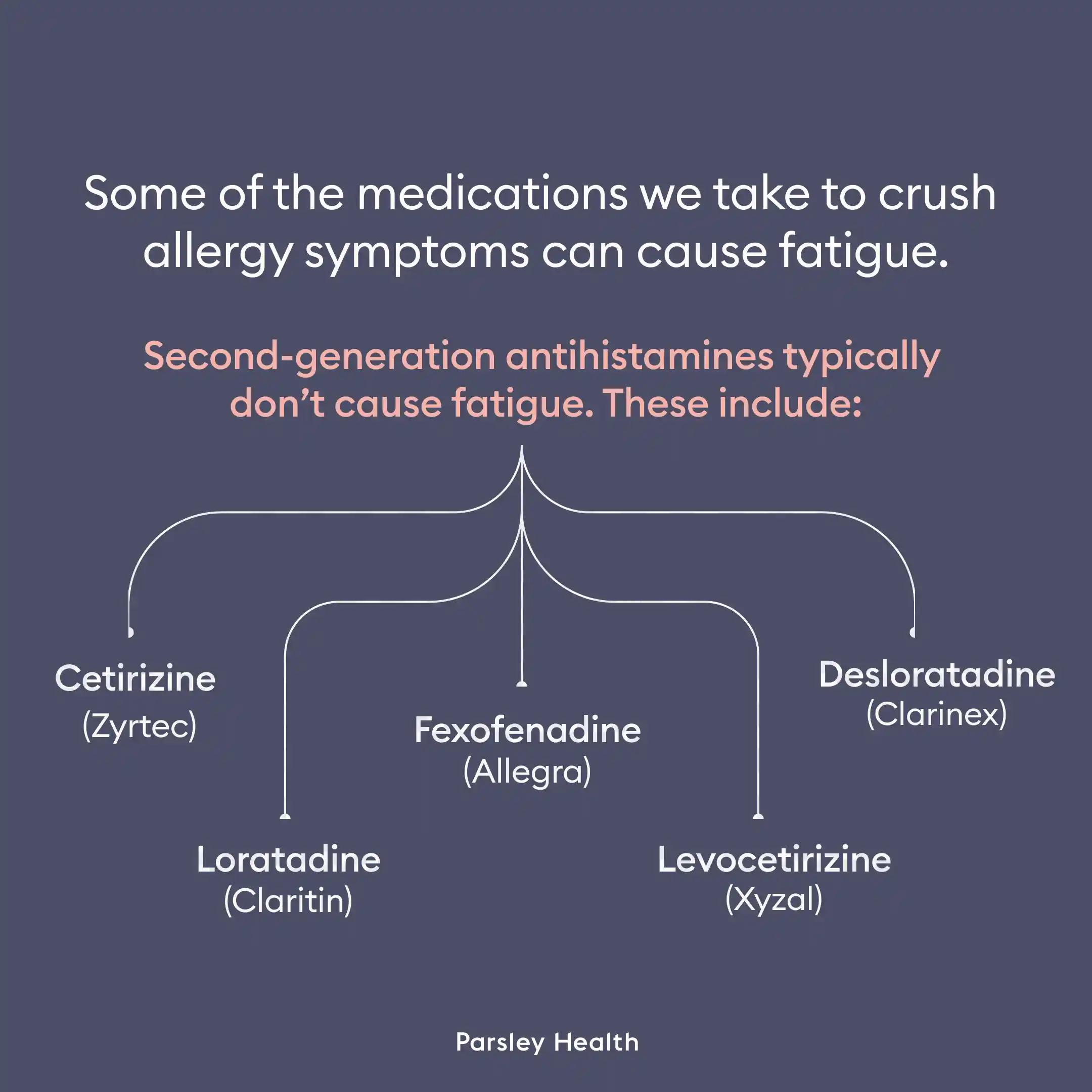Allergies can sometimes cause fatigue because your immune system is trying to protect you from a perceived threat. The resulting inflammation can tank your energy level. Allergies can also disrupt your sleep because the release of the chemical histamine causes wakefulness. Allergy symptoms can keep you tossing and turning, as well, leading to next-day tiredness. Some older allergy medications can also make you feel drowsy. Newer meds, lifestyle changes, and other strategies can help you cope.
I can personally and scientifically confirm that the answer to your question “Can allergies cause fatigue?” is a resounding YES.
I write this while currently sniffling, sneezing at my desk, and wishing I could lounge in bed with a good book and a box of tissues. But, hey, I’m here for you and ready to dive deeply into how and why allergies can cause us to feel tired, rundown, and wishing we could hibernate. Plus, we’ll explore how to combat allergy-related fatigue and feel more energetic, even in the face of triggers.

Think of your immune system as the mama bear of your body. If it senses a threat coming at you, it’s going to launch an all-out attack to try to protect you. In this case, the threat could be anything from pollen to ragweed or from dust mites to animal dander.
At the first sign of one of these allergens, your immune system produces antibodies called immunoglobulin E (IgE). These antibodies tell specific cells (called mast cells) to release a chemical called histamine. Once your cells release histamine, the chemical binds to histamine receptors (we have four different types), resulting in an allergic reaction. Typically, with environmental allergies, histamine is binding to H1 receptors, leading to symptoms like sneezing, coughing, itchy and watery eyes and nose, and inflamed or itchy skin.
Whether your mama bear immune system jumps into action will depend on whether you have a specific allergy. For example, I am allergic to cat dander, so I have cat-dander-specific IgE antibodies. If I pet a cat and then touch my face, I’ll have a major reaction. My husband is not allergic to cats, so he doesn’t have cat-dander-specific IgE antibodies and can let cats crawl all over him without concern. (Can you sense my jealousy?)
So what does this all have to do with fatigue? An allergic reaction involves inflammatory processes that can leave you feeling tanked. “The inflammatory response from the immune system takes a significant amount of energy, which also contributes to the excess fatigue and brain fog many individuals report,” says Trista Best, RD, a registered dietitian at The Candida Diet.
Histamine is closely tied to your sleep-wake cycles, as well. Researchers have known for decades that our histamine levels are highest in the early morning and that histamine causes wakefulness. But, for this reason, histamine can also impact your ability to fall or stay asleep, leading to a lack of quality pillow time. Allergy symptoms can also keep you wide awake and cuddling with the tissue box.
Complicating matters is that some of the prescription and over-the-counter medications we take to crush allergy symptoms can cause fatigue. These are called antihistamines because they block certain histamine receptors. Older antihistamines (known as first-generation antihistamines) can especially make us feel the need for a nap. Doxylamine, a common first-generation antihistamine, can be found on the ingredient list for meds like NyQuil, designed to help us sleep better when we have a cold. But second-generation antihistamines typically don’t cause fatigue.
First-generation antihistamines
- Diphenhydramine (Benadryl)
- Doxylamine (Unisom)
- Chlorpheniramine (Chlor-Trimeton)
- Hydroxyzine (Vistaril)
Second generation antihistamines
- Cetirizine (Zyrtec)
- Loratadine (Claritin)
- Fexofenadine (Allegra)
- Desloratadine (Clarinex)
- Levocetirizine (Xyzal)

Common allergies leading to fatigue
We can experience allergic reactions from environmental triggers as well as those in our diet. And all types of allergies can lead to fatigue.
Seasonal allergens
Seasonal allergens are exactly what they sound like, those allergies we notice most often in spring, summer, and fall. They include pollen from trees, grass, ragweed, and other plant sources, as well as mold spores, including those that grow on and under decaying leaves or other plant matter.
Your climate will dictate when various allergy seasons show up and disappear. For example, I live in Nashville, Tennessee, where the tree pollen season can begin as early as mid-January and is over around June. But I grew up in North Dakota, where the tree season is much shorter and doesn’t begin until the top of April and lasts into June. Grass season often starts in late spring for most regions of the United States and lasts all summer, while ragweed season stretches from August to November.
All outdoor triggers may disappear early if you live in a cooler climate that gets a good hard frost that kills them off. (Oh, I miss you for this reason, North Dakota). However, in warmer climates, these allergies can stick around. (Darn you, Tennessee).
Mold is particularly common in warmer and wetter climates. It is one of those environmental allergies that can be more difficult to pigeonhole into one season. Spring and summer rains, as well as fall and winter leaf and other plant decay, can drive the growth of mold spores.
If you think your allergies are getting worse every year, you’re not imagining this. With climate change, we’re exposed to longer seasons of pollen and mold triggers, with the tree season starting earlier, grass and ragweed seasons extending later, and mold seasons sometimes lasting year-round. Complicating matters is that air pollution can also worsen allergies.
Indoor allergens
Environmental allergies can also plague us in the comfort of our own homes or at the office. Common indoor allergens include dust mites, indoor mold, pet dander, and even cockroaches. Also, some scented cleaning or personal products can trigger allergy symptoms.
Food allergies and intolerances
Foods can cause allergic reactions, as well. Common food allergies include various nuts, eggs, cow’s milk, soy, and wheat. Peanuts were my kryptonite while growing up, but I’m fortunate to no longer have that allergy and can indulge in as much peanut butter in my yogurt as I want.
Some people also have a histamine intolerance that leads to a buildup of histamine in the body. Histamine intolerance can occur if you lack an enzyme necessary to break down the histamine you get from your diet. However, histamine intolerance is not considered a food allergy.
Understanding allergies and gut health
A growing body of research suggests a link between gut health and multiple allergies, including those to food, pollen, and animal dander.
Studies show that people with allergies often have an imbalance in gut microbiome composition, sometimes called gut dysbiosis. The gut microbiome includes all the bacteria and fungi that live in your gut. An imbalance could include reduced diversity, reduced beneficial bacteria, or increased harmful bacteria.
The gut microbiome plays a role in the immune system, and gut dysbiosis can reduce the stimulation of regulatory T-cells, which help reduce allergic responses, and can decrease the production of anti-inflammatory cytokines, immun system proteins.
A disruption to gut health can also compromise the gut barrier, potentially allowing allergens to enter the bloodstream and trigger an immune response.
Nutrition plays a role in both gut health and allergy risk. For example a higher intake of certain nutrients like retinol, vitamin A, and copper has been associated with a lower risk of allergic rhinitis, especially in the presence of beneficial gut bacteria.
While these findings suggest a strong connection between gut health and multiple allergies, the relationship is complex. Genetic predisposition and environmental factors play significant roles in allergy development, rather than just gut health alone.
Advancements in allergy treatments and their effect on fatigue
Although older allergy treatments, such as first-generation antihistamines, can contribute to sleepiness, newer medications and treatments help prevent allergic reactions and inflammation, leading to reduced symptoms and fatigue.
Antihistamines, decongestants, and corticosteroids
If you have mild allergies or just experience symptoms occasionally, you may do well with over-the-counter or prescription antihistamines, decongestants, corticosteroids, or a combination. Antihistamines block histamine from causing a reaction. They’re available in oral tablets and nasal sprays. Decongestants, taken orally, help to ease a stuffy nose. Corticosteroids help reduce inflammation, reducing symptoms. Oral corticosteroids require a prescription, but some corticosteroid nasal sprays are available over the counter.
Immunotherapy
Immunotherapy has been around for a long time. However, how it’s administered has changed over the years, making the process a little easier in some cases.
Immunotherapy often comes in the form of allergy shots. First, you undergo allergy testing to determine what you’re allergic to and to what extent. Then your doctor may prescribe allergy shots, which require you to go to your doctor’s office. These shots contain a small amount of your triggers, to help desensitize you to them. Your immune system then responds by making an antibody that blocks the allergen from causing a reaction.
For the first three to six months, allergy shots require a significant time commitment because you have to go to your doctor’s office once (or more times) per week, receive your shot, and then wait 20 to 30 minutes under the supervision of clinic staff to ensure you don’t have a severe allergic reaction. After those three to six months, you may only need to visit the clinic every four to six weeks.
Over time, your allergies may completely go away or your symptoms may lessen significantly. But the whole process requires a huge time commitment. I’m a self-described allergy-shot dropout for this reason; others never start because they aren’t fans of needles.
Another form of immunotherapy, called sublingual immunotherapy (SLIT), can simplify the process and eliminate the needles from the equation. SLIT involves taking oral tablets at home that contain a small amount of your triggers. Again, the process slowly desensitizes you.
Biologics
Biologics offer another way to treat allergies. These include omalizumab (Xolair) and dupilumab (Dupixent), among others. Many biologics consist of shots taken at regular intervals. Some you must take at a doctor’s office, while you can take others at home.
The mechanisms of action are slightly different, depending on the medication. But dupilumab, for example, blocks certain proteins that cause inflammation. I have been on dupilumab for almost five years now, giving myself monthly injections at home, and it has been life-changing. Although I still have allergy-intensive days like the one I’m having right now, these are generally few and far between.
In addition to taking allergy meds, if you need them, other methods can help you fight allergy-related fatigue.
Avoid triggers or lessen exposure
The first rule of allergy care—stay away from triggers—is easier said than done. Of course I can always wash my hands after I pet the stray cats who drop by my house for food and lovin’. But avoiding every single pollen grain, mold spore, or dust mite in the world would be impossible.
Instead, I take certain steps to reduce my exposure, which then helps to ease fatigue from allergy symptoms. For example, if I’m raking leaves or doing other yard work, I wear a dust mask. Likewise, after an outdoor run in the woods, I always wash my hair to help remove pollen. And nasal irrigation rinses, such as with a neti pot, help remove allergens, and prevent or ease symptoms.
To reduce my indoor allergy trigger exposure, I regularly dust and mop, vacuum rugs, and generally keep a clean house. I wash my bedding frequently to reduce dust mites, and I change my HVAC filters often. Plus, I avoid any personal care or cleaning products that contain my triggers.
Make lifestyle changes
Lifestyle changes can also help combat allergy-related fatigue. The first of these involves prioritizing quality sleep—that means ensuring you get at least seven hours. Exercise can also be a great tool to battle energy slumps. Although burning energy might seem counterintuitive to increasing it, research shows that physical activity can make you feel more energetic.
Change your diet
If you have histamine intolerance, which leads to a buildup of histamine in the body, you could have worsening allergy symptoms and therefore more fatigue. Histamine intolerance often causes gastrointestinal symptoms, such as acid reflux, bloating, gas, and more, but many people with histamine intolerance also experience allergic rhinitis, meaning those classic “hay fever” allergy symptoms.
If this sounds familiar, an experienced clinician can guide you through a food elimination diet to determine if high-histamine foods are a culprit for you. They can also help you tailor a low-histamine diet to your unique nutritional needs, which may only be needed temporarily.
Even if you don’t have a histamine intolerance, changing your diet can still make you feel more energetic. Up your intake of fruits and veggies and omega-3 fatty acids (all of which are anti-inflammatory) and reduce or eliminate ultra-processed foods and added sugar, both of which can drive inflammation. You can also incorporate foods that act as natural antihistamines. For example, vitamin C can help do the trick.
Address gut health
Improving gut health can potentially reduce allergy symptoms through several mechanisms. A knowlegable clinician can help you understand your unique microbiome health. They may offer solutions for increasing beneficial bacteria, which can help combat inflammation, such as the following:
- Consume probiotic foods or supplements to correct immune system imbalances.
- Increase fiber, which helps produce short-chain fatty acids, metabolites that help combat inflammation.
- Reduce exposure to foods and other factors that disrupt the gut microbiome or intestinal barrier.
Consider Supplements
Some supplements may also help. Stinging nettle, for example, shows some promise for reducing inflammation and allergic responses. And butterbur may also reduce allergy symptoms. However, some people who are allergic to related plants, such as ragweed, may experience a reaction to butterbur. Finally, bromelain, which you can take as a supplement or via noshing on pineapple, may help reduce airway irritation and mucus production.
Differentiating allergy fatigue from other conditions
Of course, allergies aren’t the only potential reason for tanked energy. That’s why seeking an evaluation from an experienced clinician who can help uncover the root cause of your fatigue is important.
If you experience excessive daytime sleepiness, a sleep disorder could be to blame. Sleep apnea, for example, is a serious condition that can be dangerous if left untreated. Additionally, chronic fatigue syndrome, also called myalgic encephalomyelitis (ME/CFS), could be another culprit. ME/CFS leads to extreme fatigue that impacts daily functioning.
FAQ
What does allergy fatigue feel like?
Allergy-related fatigue can leave you feeling low energy or generally tired and is usually accompanied by allergy symptoms such as sneezing, itching, watery nose or eyes, coughing, and more.
What are the seven allergy symptoms?
The top seven allergy symptoms include skin itching or rashes, a runny or stuffy nose, itchy or watery eyes, sneezing, throat irritation, coughing or wheezing or difficulty breathing, and dizziness.
Why are allergies so bad right now?
Allergy seasons can be different from year to year, and some years are worse than others. Climate change can lengthen allergy seasons and make them more intense. And air pollution can worsen allergy symptoms in general. Plus poor gut health and stress levels can also make allergies worse. These are just some of the reasons you may be experiencing your worst year of allergies yet.









